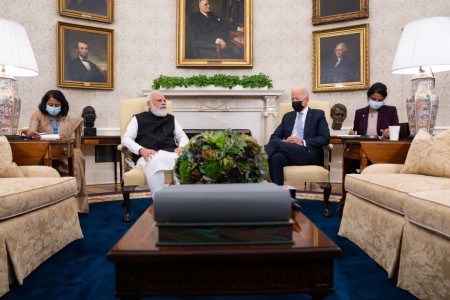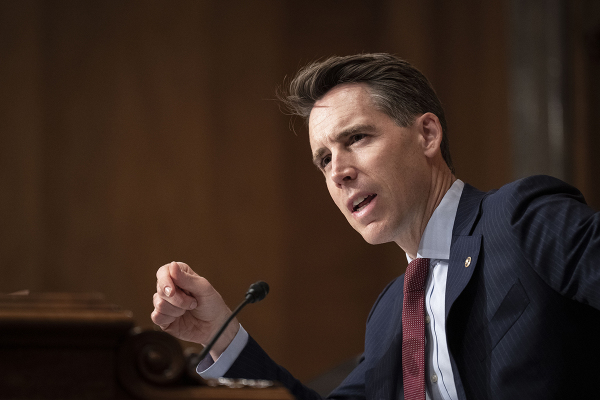Time for an axis of democratic values in Asia

The visit of India’s Prime Minister Modi with President Biden this week is well-timed. Given the turbulence the United States unleashed in Asia with the fall of Afghanistan and the rise of China, there is now no country in the world more important for US interests than the world’s largest democracy: India.
Biden and Modi must recognize their opportunity to fortify a firewall of security, peace, and freedom in Asia. Though, this time, it mustn’t be an act of political theater. It’s time for both leaders to take seriously the prospect of establishing a great Indian and American century.
For every alliance formed between tyrannical and extremist regimes — like those in the Islamic Emirate of Afghanistan and the People’s Republic of China — other alliances must be shored up between America and the world’s free nations. India and the United States have already been brought together by tragedy in Afghanistan as reports revealed this week that the suicide bomber who killed thirteen American armed forces members, and hundreds of Afghans, had previously been in a CIA controlled jail for plotting a terrorist attack in India (he was freed by the Taliban).
It is a time for choosing, once again.
The U.S. and India, for instance, may sometimes struggle separately to address some aspects of Chinese influence but together, they certainly can. India, for instance, recognizes an alliance between China and Afghanistan. This is coupled with their aggression on India’s northeastern and northwestern borders as well as China’s extortionist commercial activities in Sri Lanka which represent an existential threat to the country from the outside. Then, of course, there are insider threats from China’s aggressive technological and economic warfare.
The United States must also come to acknowledge that Washington was played like a fiddle by Beijing’s less-than-subtle enabling of the Taliban’s march on Kabul, which represented the latest (and maybe most effective yet) front in a live-fire information war targeting U.S. credibility in the world.
It’s convenient for China to white-wash its Uyghur Muslim genocide by the endorsement of its preferred (Taliban) Muslims in Kabul (and Pakistan). Meanwhile, the Taliban — quick to express their solidarity with Muslims in Kashmir —will be totally silent on China’s treatment of its Uyghurs just across the Afghan border in Xinjiang.
But has a senior U.S. or Indian official yet pointed out this incongruence?
Not that we have seen. That’s because the United States and India are still playing too nice with Xi’s remake of Chinese Communism, which is a relapse to Mao’s Cultural Revolution.
It is Xi’s systemic deconstruction of the prosperous policies of China’s great reformer of the last generation Deng Xiaoping. The United States has been too interested in making collective statements with its far less diverse, majority white, European allies than its brilliantly diverse and immensely powerful, loyal friend in India.
India’s friends are America’s friends beginning with the State of Israel. Israel is a country that understands more than any other the threat of Islamist extremism. Israel understands when its staunch ally India says that Pakistan’s decades-long bleeding of India through its insurgency into Kashmir will merit a boost of morale and weapons for Kashmir terrorists, emboldened by the Taliban’s victory in Afghanistan.
America’s chaotic exit from Afghanistan was a shot in the arm for all Islamist terror groups. Along with their Taliban ally, ISIS is as confident and motivated as ever, and will surely take advantage of any nation’s weakness in the days ahead. The terrorist attack in New Zealand recently was no coincidence, coming just days after the exit of the US from Kabul. Though less noticed, there have been multiple other terrorist attacks across democratic states in Africa (also allies of Israel and the United States).
And the great terror march on Kabul would not have been possible without some sort of support, if only the promise of legitimacy, by Beijing. The Taliban have even lauded Beijing as their most important economic ally.
A weakened democratic West led by the U.S. would fit well with China’s long-term imperial ambitions. Those ambitions have long been recognized for what they are by India: Xi’s Party is a neo-colonial movement that threatens the autonomy of countless free nations and therefore the prosperity and security of the entire world.
In other words, Washington could learn much from Delhi as the two countries work with Japan and Australia — other members of the so-called QUAD — to build an impenetrable Great Wall of Democratic Values in Asia. That wall too must be fortified by Modi’s assurance and actions for his country’s Muslims and Christians to guarantee their religious liberties will be as indispensable to India’s future as they have been during India’s long history. In the United States, similar efforts must be undertaken to ensure that America’s vibrant public square doesn’t degrade into a grand exercise in politics-for-the-sake-of-politics.
But now is the time for India’s Modi and America’s Biden to embrace a century-long vision that will ensure peace and security for future generations.
Weaknesses exposed in both nations in recent years will be evaluated but it’s time to look ahead and move forward in the right direction.
Together, India and America can do something they may struggle to do alone: guarantee an Axis of Democratic Values in Asia as the prevailing story of the 21st century.
Archbishop Joseph D’Souza is an internationally renowned human and civil rights activist. He is the founder of Dignity Freedom Network, an organization that advocates for and delivers humanitarian aid to the marginalized and outcastes of South Asia. He is archbishop of the Anglican Good Shepherd Church of India and serves as the president of the All India Christian Council.
Rev. Johnnie Moore is President of The Congress of Christian Leaders and founder of The KAIROS Company. He is the author of “The Next Jihad,” a recipient of the Simon Wiesenthal Center’s “medal of valor,” and twice served as a Commissioner on the U.S. Commission for International Religious Freedom.





















